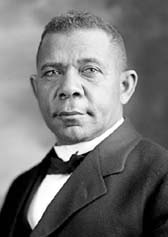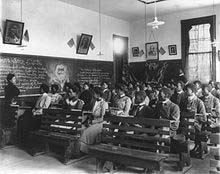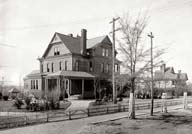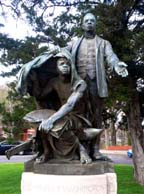
Booker T. Washington
Educator � Author � Orator � Advisor
 History class |
 Washington's House at Tuskegee |
 Removing the Cloke of Ignorance
|
INTRODUCTION
Washington was born into slavery with a Black mother and a White father. His mother moved the family to West Virginia where Washington grew up working in a variety of manual labor jobs before making his way to Hampton Roads where he got his beginning education. He worked his way through Hampton and then to the school that has become Virginia Union University. He later taught school and married Fannie Smith in 1881. In 1881 he returned to Hampton as a teacher. He was then named the leader of the new Tuskegee Institute in Alabama. He built a national network of supporters including, Black ministers, educators, businessmen. These elements became his core support group. He also gained support with rich White liberals. With their financial support he was able to build and operate thousands of small community schools and institutions of higher education. Washington argued that the surest way for Black people to gain equal social rights was to demonstrate thrift, intelligence, industry and obtain property. Although Washington received wide support he did have his critics. One group of his critics was the NAACP and its main founder W.E.B. Du Bois. Du Bois demanded a stronger tone of protest for the advancement of civil rights for Blacks. The word �demanded� was not one that Washington would have used in dealing with the White power structure. That was the line of difference between the two men. Washington felt that confrontation would lead to disaster for the outnumbered Blacks. His position was that cooperation with supportive Whites was the only way to overcome pervasive racism in the long run. Even so he secretly funded litigation for civil rights cases such as challenging southern laws that disfranchised Blacks. Washington was on friendly terms with White national Republican leaders and was frequently solicited for advice by presidents William Howard Taft and Theodore Roosevelt. In addition to contribution in education he wrote 14 books. The most notable was his autobiography, �Up From Slavery.� During a very difficulty transition between the races he did yeoman work in improving the working relationship of these two races. This contributed to Blacks obtaining the needed skills to create and support the Civil Rights Movement of the 1960�s which led to the passage of many federal civil rights laws. The organizers of the new all Black state school named Tuskegee Institute chose Washington its first president. This proved to be an excellent choice. Washington was 25 at the time and full of energy and ideas. Washington believed that people could rise from poverty to success. The opening of the school was July 4, 1881 with its original location being a local church. The next year, Washington purchased a former plantation that became the permanent location of the school. Under Washington�s direction the students built their own school brick by brick and nail by nail. They made their own bricks and built the barns, classrooms and outbuildings. They grew their own crops and raised their own livestock. All students, men and women had to learn trades and academics. The skills learned at Tuskegee by its students were taken back to their communities, mostly in the rural South, and put to good use. The main purpose of the school was to produce farmers and tradesmen. More programs were added to the curriculum as time went on. The school drew the attention of many prominent people. Shortly after the successful conclusion of the Spanish-American war President William McKinley and the bulk of his cabinet visited Tuskegee. Washington�s slow growth methods were in contrast to those of W. E. B. Du Bois and the NAACP. At first Du Bois was in approval of Washington and Tuskegee but as the methods of Washington expanded their relationship grew apart. De Bois sought more action to change the disenfranchisement of Blacks. Washington was a main speaker at the Atlanta Cotton States and International Exposition (Atlanta Exposition). After his speech was delivered Du Bois and the NAACP referred to it as the �Atlanta Compromise." They did so to express their criticism of Washington. They felt that Washington was to accommodating to the interests of Whites. Washington felt that a more forcefull than �go slow� approach would bring on a harsh White backlash. Washington�s approach was in contrast to those of educated northern Blacks like Du Bois. They wanted Blacks to have classical liberal arts training as did Whites along with voting rights and civic equality. A lot of Black northerners felt that they were being led by a Southern accommodations who was under the control of Southern Whites. These differences came head to head following the Atlanta Exposition.
ATLANTA COTTON STATES AND INTERNATIONAL EXPOSITIONThis exposition was held on September 18, 1895. Washington made a speech that addressed the topic of relations between the races on since the Civil War. His speech resulted in the foundation that would become un-complementary as the �Atlanta Compromise.� The Atlanta Compromise was an agreement between Black American leaders and Southern White leaders. It stated that Blacks would work for low wages and submit themselves to White political rule. Also Southern Whites would guarantee that Blacks would receive basic education and due process of law. The majority of those in attendance were White. Washington�s speech is considered by many as being one of the most important and influential speeches in United States history. He began his speech by addressing the Blacks in the audience. He said that the South was where Blacks were given opportunity in commerce and not the North. Blacks made up one-third of the South�s population. He asked the White audience not to rely on Whites emigrating from Europe, who were arriving at the rate of a million a year. He said that they should hire some of the nation�s eight million resident Blacks. He praised the loyalty and fidelity and the love from the Black population in the service to the White population. He continued by warning the Whites that Blacks could be a great burden on society if current oppression continued. He said that the progress of the South was inherently tied to the treatment of Blacks and the protection of their liberties. He spoke of the inequality between commercial legality and social acceptance: �The opportunity to earn a dollar in a factory just now is worth infinitely more that the opportunity to spend a dollar in an opera house.� He closed his speech with words that defined his approach and are used to this day to define him. Not only did it define his approach but it pleased the vast majority of Whites in the country.
"In all things that are purely social we can be as separate as the fingers, yet one as the hand in all things essential to mutual progress.�WEALTHY FRIENDS AND SUPPORTERSWashington was able achieve much that he had done because of his rich White friends in high places. Friends such as Andrew Carnegie, Robert C. Ogden, William Howard Taft, John D. Rockefeller, Henry Rogers, George Eastman, and Julius Rosenwald . Donations by Collis Potter Huntington and William H. Baldwin Jr. allowed Washington to create many small schools throughout the South. When Washington published his autobiography in 1901 it became a best seller and had a major impact on America�s African American community and on President Theodore Roosevelt. So much so that Roosevelt invited Washington to dinner at the White House. However, all did not applaud this invitation, two of which were Mississippi Governor James K. Vardaman and Senator Benjamin Tillman of South Carolina. Vardaman said of the White House invitation: � so saturated with the odor of the nigger that the rats have taken refuge in the stable� and declared� I am just as much opposed to Booker T. Washington as a voter as I am to the cocoanut-headed chocolate-colored typical little coon who blacks my shoes every morning. Neither is fit to perform the supreme function of citizenship.� Tillman opined �The action of President Roosevelt in entertaining that nigger will necessitate our killing a thousand niggers in the South before they will learn their place again.� DEATHWhen Washington took sick in New York City he was brought home to Tuskegee, where he died on November 14, 1915. He was 59 years of age. The cause of death was hypertension and a blood pressure that was more than twice normal. Washington is buried on the campus of Tuskegee near the University Chapel. BOOKS BY WASHINGTONThe Story of My Life and Work (1900) Up From Slavery ( 1901) The Story of the Negro: The Rise of the Race from Slavery (2 vol 1909) My Larger Education (1911) The man Farthest Down (1912) |